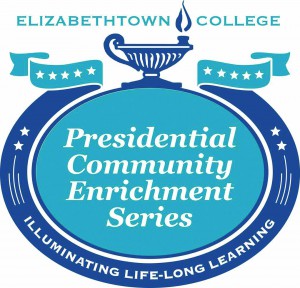 “This talk is me taking note of how the Bible works,” said Dr. Richard Newton, assistant professor of religious studies at Elizabethtown College. On Oct. 7, Newton discusses the ties of the African-American culture to the Bible as part of the Presidential Community Enrichment Series. The noontime talk, in the Susquehanna Room at Myers Hall, is $15; lunch is provided. Audience discussion has a significant role in Newton’s lecture as he finds that, “discussion is writing the next chapter.”
“This talk is me taking note of how the Bible works,” said Dr. Richard Newton, assistant professor of religious studies at Elizabethtown College. On Oct. 7, Newton discusses the ties of the African-American culture to the Bible as part of the Presidential Community Enrichment Series. The noontime talk, in the Susquehanna Room at Myers Hall, is $15; lunch is provided. Audience discussion has a significant role in Newton’s lecture as he finds that, “discussion is writing the next chapter.”
“I’ve been researching scriptures for a while, and I have been living as an African-American in America all my life, so I’ve seen how the Bible is a blessing and a curse,” said Newton in a recent interview about his research.
Newton’s passion in anthropology has always pulled him to seek answers in understanding the Bible’s influences on society. As he describes, the Bible, “shapes Americans’ responses.” Having such an impact on everyday life, the scriptures have become a guideline that blesses and chains the black society and America as a whole.
People are interpreting the Bible in multiple ways, and the diversity of social events and how people read into it makes it interesting.”
Current events, he said, constantly create connections between the Bible and black culture. From issues with the Confederate flag, to the Black Lives Matter campaign, the constant conflicts involving African-Americans show the phenomenon of the Bible and its ties to everyday life.
“For better or worse, there’s always something to talk about,” explained Newton.
In his talk, he also discusses how historic events have a connection with the Bible’s lessons. He will begin by linking the creation story in the Bible to moments in slavery, he said, then continue doing the same for events up to Black Lives Matter. From using the figures of Martin Luther King Jr. to President Barack Obama, he plans to explain how African-American history has depended on Bible stories.
“We’re really talking about a framework,” said Newton. “People are interpreting the Bible in multiple ways, and the diversity of social events and how people read into it makes it interesting.”
Newton has shared his presentation and research twice in 2015 — once in February among collegiate students in New York and then to E-town alumnus in Florida this past summer. The discussions at both conventions brought up serious points about points about identity, the Bible, and racial tensions in the United States.
“These aren’t going away in America,” Newton said. “Part of being in a Christian Nation is that what people think the Bible says impacts these and other social realities.”
Although racial and political issues will have a significant part in Newton’s talk, the real discussion focuses on how, “Scriptures are not just the stories we read; they’re the ones that read us back.” In his observations, Bible stories interpret who you are and who you can be. And with this power, the Bible becomes the most influential tool to be heard in this country. Yet, it also can be the binding force that creates friction in American society.
As Newton explained, the role of religion, especially Christianity, shapes the thoughts, actions and social events in the United States. With recognizing the connection between the Bible’s teachings and the history in African-American society, “it’s a conversation that can hopefully affect change and mind,” he said.

